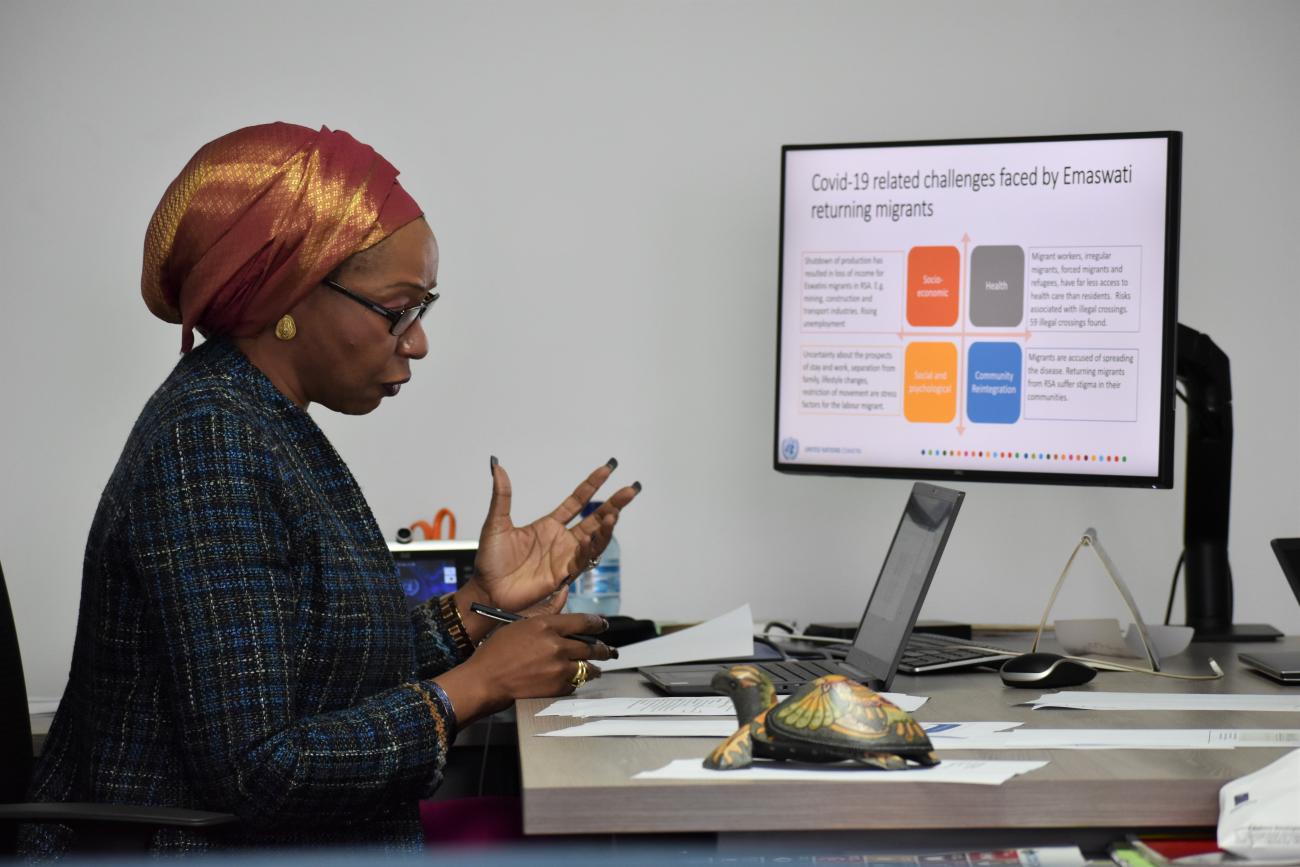UN Resident Coordinator Participates in a Meeting on the ‘Impact of COVID-19 on Migration in Eastern and Southern Africa’

Hosted by the UN Development Coordination Office, the UNRC presented on “Challenges of Returning Migrants/Deportees in Relation to COVID-19 in Eswatini".
On Thursday, 18th June 2020, the UN Resident Coordinator, Ms Nathalie Ndongo-Seh, presented to UN Regional Directors and Resident Coordinators in Eastern and Southern Africa, on “Challenges of Returning Migrants/Deportees in Relation to COVID-19 in Eswatini”. Ms Ndongo-Seh’s presentation was shared during the UN Development Coordination Office’s (DCO) meeting on the ‘Impact of COVID-19 on Migration in Eastern and Southern Africa’.
As COVID-19 spreads around the world, vulnerable groups such as migrants, particularly in Eastern and Southern Africa, are adversely impacted by the pandemic. Eswatini, with a small population of 1.1 million people, faces a rising number of confirmed COVID-19 cases, standing at 586, making migrants evermore at risk.
The UN Resident Coordinator expressed the impacts on migrants and deportees in Eswatini due to COVID-19; ranging from socio-economic to health, social and psychological, and community reintegration.
With 40,090 of Eswatini’s totalled 42,411 migrants living in South Africa, the shutdown of production in South Africa has resulted in rising unemployment and substantial loss of income for emaSwati migrants, notably in industries such as mining, construction and transport industries.
The health pandemic puts migrant workers, irregular migrants, forced migrants and refugees, at risk due to limited access to healthcare. Migrants usually have much less access to healthcare than residents, making them particularly vulnerable to COVID-19.
Migrants seeking better healthcare or socio-economic opportunities are sometimes driven to crossing borders illegally. Eswatini has a total of 13 border posts; 11 are shared with South Africa and two (2) with Mozambique, and so far, 59 illegal crossings have been identified since COVID-19.
COVID-19 has also limited the movements of many migrants who face uncertainty regarding work, lifestyle and separation from family. 83 Emaswati have been repatriated to Eswatini since the COVID-19 outbreak, many of whom were students studying abroad. All repatriates undergo a 14 day quarantine period, paid for by the Government.
So too are migrants often accused of spreading the coronavirus, as sigma builds around the world, notably experienced by emaSwati returning to Eswatini from South Africa.
However, Eswatini is working to protect migrants by being one of the countries to support the Global Compact on Migration, ratified in 2018 in Marrakesh. In 2017, Eswatini hosted the Ministerial Migration Dialogue for Southern Africa (MIDSA) which resulted in the establishment of the UN’s International Organisation for Migration (IOM). Eswatini also developed its Labour Migration Policy to protect migrant workers, develop the country’s economy, integrate returnees and transfer their skills to ultimately benefit the entire Kingdom.
The UN Resident Coordinator closed her presentation by highlighting the opportunities provided by the COVID-19 outbreak, such as: to run impactful awareness campaigns to prevent the trafficking of persons, especially children; engage with and involve diaspora; provide shelter for migrants and update migrant data.
As COVID-19 continues to impact the world, we cannot afford to leave anyone behind. Let us embrace the opportunities within the pandemic. Agenda 2030 seeks to achieve the Sustainable Development Goals for all, including migrants, who are of benefit to our nation.





